The History of United Nations Day
United Nations Day, commemorating the founding of one of the most impactful international organizations in modern history. United Nations Day serves as a reminder of the ideals that led to the creation of the UN in 1945, following the devastating impact of World War II. The UN was established to foster international cooperation, promote peace and security, and encourage respect for human rights across the globe.
This day is more than just an anniversary; it represents the global community’s commitment to tackling the world’s most pressing challenges together. From maintaining peace and security to addressing climate change, eradicating poverty, and promoting sustainable development, the UN continues to play a vital role in shaping a more harmonious and equitable world. This post will explore the history, structure, impact, and ongoing significance of the United Nations, highlighting why United Nations Day remains a crucial celebration for the international community.
The story of the United Nations dates back to the closing days of World War II when countries recognized the need for a new framework to ensure lasting peace. After two world wars in less than three decades, leaders around the globe saw the necessity for a global organization that could prevent further conflicts.
- World Standards Day 2024 — Celebrating the Role of Standards in Global Progress
- Celebrate Dussehra 2024 — Heartfelt Wishes in 15+ Indian Languages
Formation of the UN and Early Goals

In 1945, representatives from 50 countries met in San Francisco to draft the UN Charter. The Charter outlined the principles and structure of the United Nations, establishing its primary objectives: maintaining peace, fostering friendly relations among nations, promoting social progress, and improving standards of life worldwide. The UN officially came into existence on October 24, 1945, when the Charter was ratified by the United States, China, the Soviet Union, France, and the United Kingdom, along with a majority of the other signatories.
- The Role of the UN Charter
The UN Charter is often considered the organization’s foundational document, setting forth its objectives and guiding principles. The Charter establishes the UN as an institution dedicated to peace and mutual cooperation among its member states. The preamble emphasizes the commitment of “We the Peoples of the United Nations” to save succeeding generations from the scourge of war, reaffirm human rights, and promote social progress. This mission statement remains as relevant today as it was at the UN’s founding.
- Official Recognition of United Nations Day
In 1947, just two years after the UN’s founding, the General Assembly declared October 24 as United Nations Day. The Assembly intended the day to be a time for member states and their citizens to recognize the importance of the UN’s mission and work. Today, UN Day is celebrated around the world with events and initiatives that highlight the ongoing efforts of the organization in areas such as peacebuilding, human rights advocacy, and sustainable development.
The United Nations Today: Purpose and Function
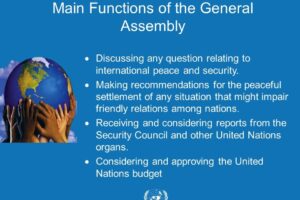
The United Nations has grown significantly since its founding and now encompasses a wide range of functions. The core functions of the UN can be broken down into several key areas, each of which addresses a crucial aspect of international relations and development.
-
Maintaining International Peace and Security
The UN’s primary purpose is to prevent armed conflicts and resolve disputes between nations. The Security Council is responsible for this mission, wielding considerable authority to authorize peacekeeping missions, impose sanctions, and even approve military action when necessary. The UN’s peacekeeping missions involve military personnel, police, and civilian staff working in regions experiencing or emerging from conflict. These missions help prevent the resurgence of violence, protect civilians, and support local governments in rebuilding their institutions. Examples of peacekeeping missions include long-standing operations in Cyprus, Lebanon, and the Democratic Republic of Congo.
-
Promoting Human Rights
The UN has established a framework to protect and promote human rights worldwide. The adoption of the Universal Declaration of Human Rights (UDHR) in 1948 marked a significant milestone, affirming the fundamental rights to which all people are entitled, regardless of nationality, race, or religion. Agencies like the UN Human Rights Council (UNHRC) monitor and investigate human rights violations, offer technical assistance to states, and work to ensure that the rights of marginalized groups are protected. Special rapporteurs and committees address specific issues, such as freedom of expression, discrimination, and the rights of Indigenous peoples.
-
Fostering Social and Economic Development
The UN’s commitment to social and economic development is reflected in initiatives that tackle global poverty, promote health and education, and foster gender equality. The 2030 Agenda for Sustainable Development, adopted in 2015, outlines 17 Sustainable Development Goals (SDGs) to be achieved by 2030. These goals include ending poverty, achieving gender equality, and ensuring access to quality education. UN agencies such as the United Nations Development Programme (UNDP), the United Nations Children’s Fund (UNICEF), and the World Health Organization (WHO) work on the ground to implement projects in developing countries, helping to build infrastructure, support healthcare systems, and improve education access.
-
Addressing Climate Change
Climate change is one of the most critical issues of our time, and the UN plays a central role in coordinating international efforts to combat it. Through the UN Framework Convention on Climate Change (UNFCCC), the UN has facilitated landmark agreements such as the 2015 Paris Agreement, where countries committed to limiting global warming and reducing carbon emissions. The UN also works on raising awareness, coordinating research, and mobilizing resources to help countries adapt to climate change and transition to sustainable energy sources. Events like the annual Conference of the Parties (COP) bring world leaders together to discuss climate policy and assess progress.
-
Providing Humanitarian Aid
Humanitarian aid is a vital component of the UN’s work, particularly in response to crises such as natural disasters, armed conflicts, and epidemics. The UN’s Office for the Coordination of Humanitarian Affairs (OCHA) oversees international responses to emergencies, coordinating with other agencies and non-governmental organizations to deliver food, medical supplies, and shelter to those in need. The United Nations Refugee Agency (UNHCR) assists displaced populations, providing critical support to refugees and advocating for their rights. The World Food Programme (WFP), a Nobel Peace Prize laureate, also plays a major role in fighting hunger and delivering food aid in crisis-affected areas.
Key Agencies and Bodies of the United Nations
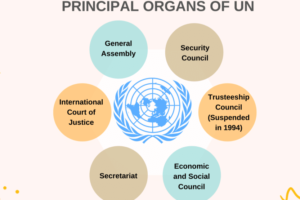
The UN consists of various agencies and specialized bodies, each dedicated to specific tasks. These agencies address issues ranging from health and education to trade and the environment, collectively working toward the UN’s overarching mission.
-
The General Assembly
The General Assembly is the UN’s main deliberative body, where all 193 member states have equal representation. It meets annually to discuss and make recommendations on international issues, including peace and security, economic growth, and social justice. Although its resolutions are non-binding, the Assembly plays an essential role in setting global norms and reflecting the consensus of the international community.
-
The Security Council
The Security Council is perhaps the most powerful body within the UN. Composed of 15 members, including five permanent members with veto power, the Security Council is responsible for addressing threats to international peace and security. When a crisis arises, the Security Council can authorize peacekeeping missions, sanctions, and even military intervention. The Council’s decisions are legally binding, making it a crucial player in global politics.
-
The International Court of Justice (ICJ)
Located in The Hague, the International Court of Justice is the UN’s principal judicial body. The ICJ settles disputes between states based on international law and provides advisory opinions on legal questions referred by the General Assembly, the Security Council, or other UN agencies. The Court’s role in resolving disputes peacefully has made it an essential component of the UN’s mission to maintain international order.
-
The Secretariat
The Secretariat is responsible for the UN’s day-to-day operations and is headed by the Secretary-General, who is appointed for a five-year term. The Secretary-General represents the UN on the world stage and is often considered the face of the organization. The Secretariat carries out the decisions of the UN’s principal organs and provides research, information, and support to member states.
-
Specialized Agencies
The UN’s specialized agencies operate independently but work with the organization to address specific issues. Agencies like the World Health Organization (WHO), the International Monetary Fund (IMF), and UNESCO play vital roles in global health, economic stability, and education. Each agency has its mandate and funding sources, allowing it to focus on its area of expertise. For example, UNESCO promotes cultural heritage and education, while the World Health Organization coordinates international efforts to improve public health and manage disease outbreaks.
United Nations Day Around the World
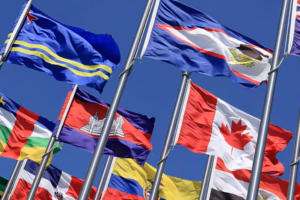
-
UN Day Celebrations in Member States
In many countries, United Nations Day is marked by events held at national UN offices, schools, and community centers. Activities often include speeches by government officials and UN representatives, exhibitions, and discussions on the UN’s role in addressing global challenges. Educational programs in schools introduce students to the UN’s mission, encouraging them to think about issues such as peace, human rights, and sustainability.
-
Global Observances and Online Engagements
The UN uses digital platforms to engage a global audience, especially on United Nations Day. Social media campaigns, live-streamed events, and online discussions allow people worldwide to participate in celebrating the UN’s achievements and exploring its goals. Webinars and virtual panels featuring experts on issues like climate change, gender equality, and human rights provide a platform for meaningful dialogue.
-
Special UN Day Activities for Youth
Many UN Day events target young people, encouraging them to learn about global issues and get involved in international affairs. Youth-oriented programs include Model UN simulations, where students role-play as diplomats and learn about the UN’s decision-making processes. In some countries, youth groups host community service projects, fundraisers, or environmental cleanup events to honor the day.
-
Cultural Programs and Performances
At the UN headquarters in New York, United Nations Day is celebrated with cultural events, including musical performances and art exhibitions. These events showcase the diversity of the UN’s member states and highlight the organization’s commitment to cultural exchange and mutual understanding. Artists from different countries often perform, celebrating the themes of peace, unity, and diversity.
Challenges and Criticisms of the United Nations
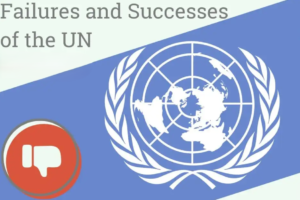
-
Bureaucracy and Inefficiency
One of the most common criticisms of the UN is that its bureaucratic structure can lead to inefficiency. With multiple departments and layers of administration, decision-making processes can be slow, making it challenging for the UN to respond quickly to crises. Critics argue that the UN needs to streamline its operations and improve accountability to be more effective.
-
Inadequate Resources and Funding
The UN relies heavily on contributions from member states to fund its programs, but financial shortfalls can limit its ability to carry out essential tasks. Some countries fail to pay their dues on time, creating budget gaps that hinder the UN’s operations. This issue has led to calls for alternative funding mechanisms, such as partnerships with the private sector or fundraising campaigns.
-
Political Influence and Veto Power
The Security Council’s permanent members hold veto power, which allows them to block resolutions they disagree with. This structure can lead to gridlock, especially when the interests of powerful countries are at stake. For example, Russia and the United States have used their vetoes to prevent action on issues related to Syria and Israel, respectively. This situation has led some to advocate for reforming the Security Council to make it more representative and democratic.
-
Human Rights and Accountability Issues
The UN has faced criticism over its handling of human rights issues, particularly regarding peacekeeper conduct. Allegations of sexual exploitation by UN peacekeepers in countries like the Central African Republic have damaged the organization’s reputation. Although the UN has taken steps to address these issues, such as implementing stricter codes of conduct, critics argue that more needs to be done to ensure accountability.
-
Calls for Reform
Many experts argue that the UN needs to adapt to the changing global landscape. Proposals for reform include expanding the Security Council to include more permanent members, improving transparency, and increasing the UN’s focus on emerging issues like cyber threats and climate change. As the world faces new challenges, the UN must evolve to remain relevant and effective.
The Impact of the United Nations on Global Issues
Over the decades, the UN has had a profound impact on various global issues, from promoting health and education to addressing climate change and poverty.
-
Global Health Initiatives
The World Health Organization (WHO) has led international efforts to eradicate diseases like smallpox and polio. WHO also coordinates responses to global health emergencies, such as the Ebola and COVID-19 pandemics, providing countries with guidance and resources to protect public health. Through initiatives like the COVAX program, the UN has worked to ensure equitable access to vaccines and treatments, especially in low-income countries.
-
Climate Change Action
The UN has been a driving force in the global effort to combat climate change, bringing together countries to negotiate agreements like the Kyoto Protocol and the Paris Agreement. Through these frameworks, the UN encourages nations to set emissions reduction targets, promote renewable energy, and protect natural resources. The UN Environment Programme (UNEP) also supports countries in developing strategies for climate adaptation and resilience.
-
Human Rights Protection
The UN has established mechanisms to protect human rights and hold violators accountable. The International Criminal Court (ICC), for example, prosecutes individuals for genocide, war crimes, and crimes against humanity. The UN’s advocacy for vulnerable populations, including women, children, and refugees, has helped to raise awareness of human rights issues and drive policy changes worldwide.
-
Sustainable Development and Poverty Alleviation
The UN’s Sustainable Development Goals (SDGs) provide a blueprint for improving living conditions globally. These goals focus on ending poverty, promoting quality education, and ensuring access to clean water and sanitation. Through partnerships with governments, NGOs, and the private sector, the UN has launched projects that improve infrastructure, increase agricultural productivity, and create job opportunities in developing countries.
How Individuals Can Support the United Nations
United Nations Day is a reminder that individuals can contribute to the UN’s mission and support its efforts to build a better world.
-
Volunteering with UN Programs
The UN offers a range of volunteer opportunities, allowing individuals to work on projects related to health, education, and environmental protection. The United Nations Volunteers (UNV) program places volunteers in over 140 countries, where they support local development initiatives and contribute to peacebuilding efforts.
-
Donating to UN Causes
Many UN agencies, such as UNICEF and the World Food Programme, rely on donations to fund their work. By contributing to these organizations, individuals can help provide food, shelter, and medical care to those in need. Donations also support long-term development projects that improve education and healthcare access in underserved communities.
-
Advocacy and Awareness-Raising
Individuals can help raise awareness of global issues by sharing information about the UN’s work with their networks. Advocacy efforts, such as signing petitions, contacting elected officials, and participating in local campaigns, can also support policies that align with the UN’s goals, from climate action to human rights protection.
-
Supporting the Sustainable Development Goals (SDGs)
Individuals can take action to support the SDGs in their everyday lives, whether by reducing their carbon footprint, supporting fair trade, or volunteering with organizations that promote sustainability. The UN provides resources, such as the ActNow campaign, to help people make lifestyle choices that contribute to a healthier planet and a fairer society.
The Future of the United Nations
As the UN faces new and evolving challenges, it must adapt to remain relevant in a rapidly changing world. United Nations Day offers a moment to consider the organization’s future and the ways it can continue to serve humanity.
-
Addressing Emerging Threats
The UN must confront new threats, such as cybersecurity issues, artificial intelligence, and bioterrorism, that require innovative solutions and global cooperation. By fostering partnerships with tech companies and research institutions, the UN can develop strategies to address these challenges and protect global security.
-
Expanding the Role of Technology in UN Operations
Technology can enhance the UN’s ability to collect data, monitor situations in real-time, and respond to crises more effectively. The UN has already begun using drones, satellite imagery, and data analytics to improve disaster response and support peacekeeping operations. In the future, advancements in artificial intelligence and machine learning could further transform the UN’s work.
-
Promoting Youth Involvement and Leadership
To ensure long-term sustainability, the UN must engage with young people and empower them to take on leadership roles. Programs like the UN Youth Delegates program give young people a voice in international discussions, and initiatives like the Youth 2030 strategy aim to strengthen the UN’s connection with young communities.
-
Ensuring Sustainable Funding and Support
The UN will need to secure more reliable funding sources to continue its work. This could involve exploring partnerships with the private sector, diversifying revenue streams, and encouraging member states to fulfill their financial commitments. By ensuring stable funding, the UN can maintain its ability to respond to global crises and support sustainable development efforts.
Our Final Conclusion
United Nations Day is an opportunity to celebrate the UN’s achievements and recognize the vital role it plays in our world. As the UN continues its mission of promoting peace, defending human rights, and fostering sustainable development, individuals and nations alike have a role to play in supporting this work. By working together, we can help the UN build a more just, equitable, and peaceful world for future generations. Stay tuned with us on Facebook for more information about every Important day.
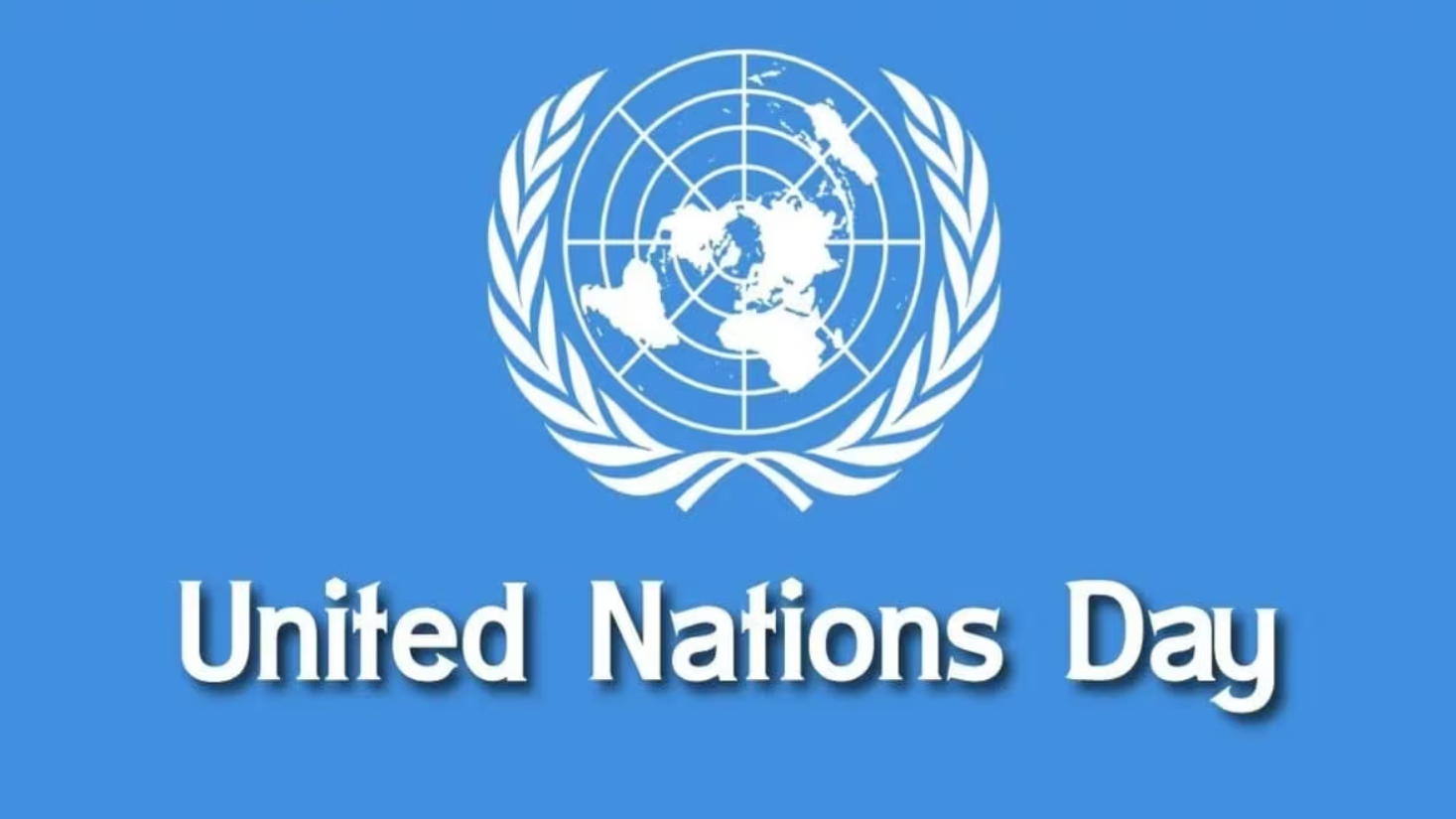
[…] United Nations Day — Celebrating Global Unity and Cooperation […]
[…] United Nations Day — Celebrating Global Unity and Cooperation […]